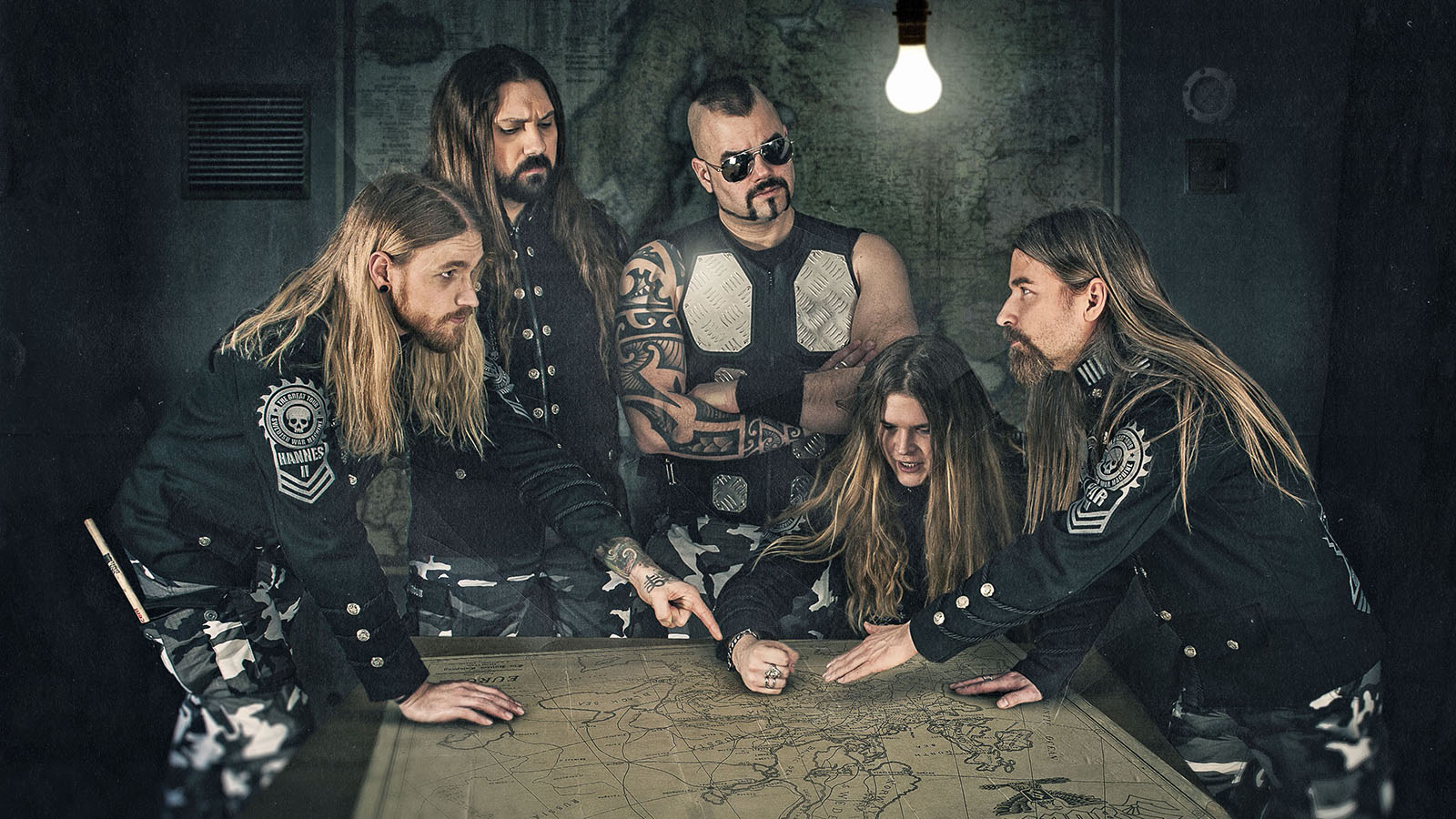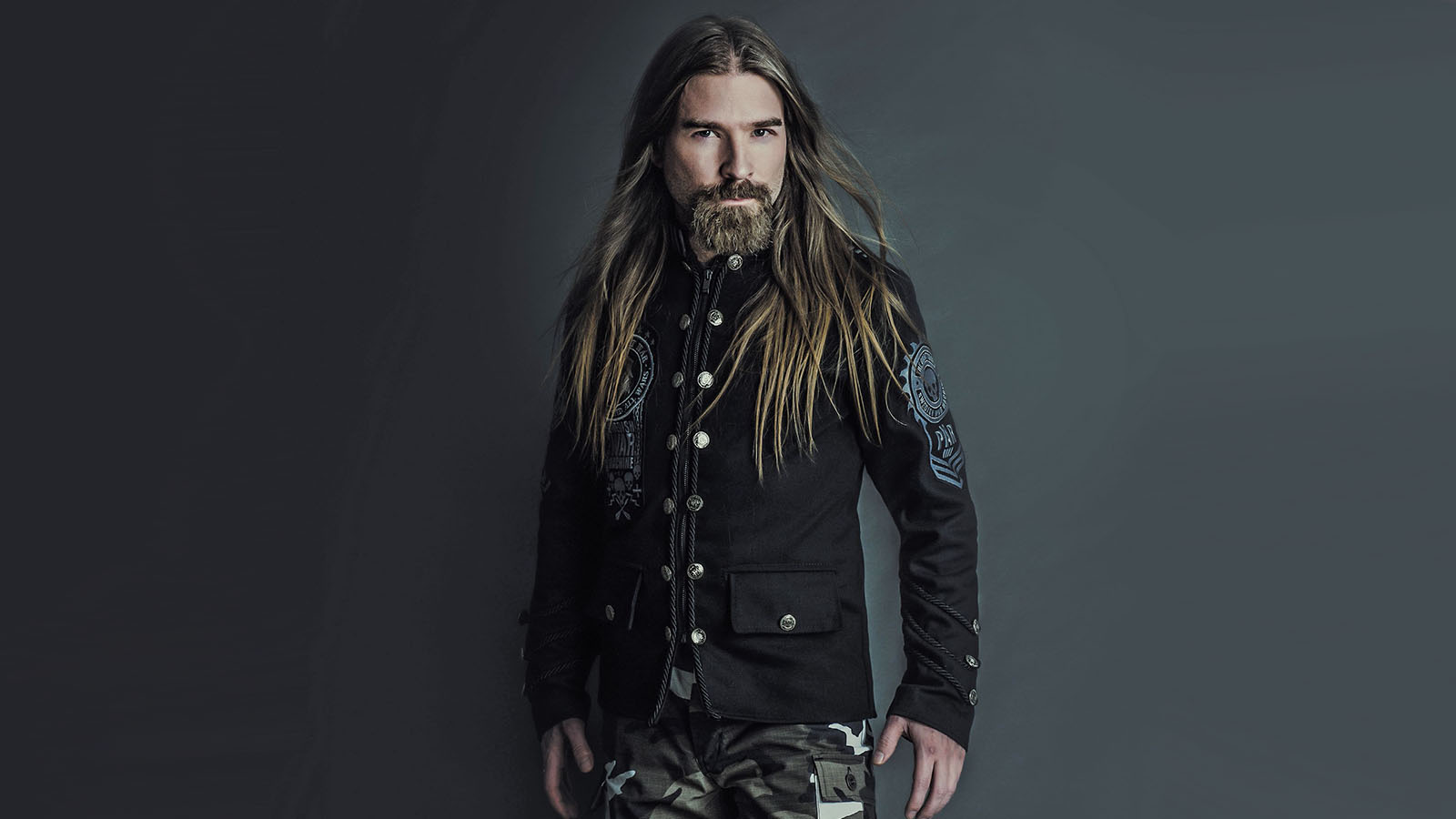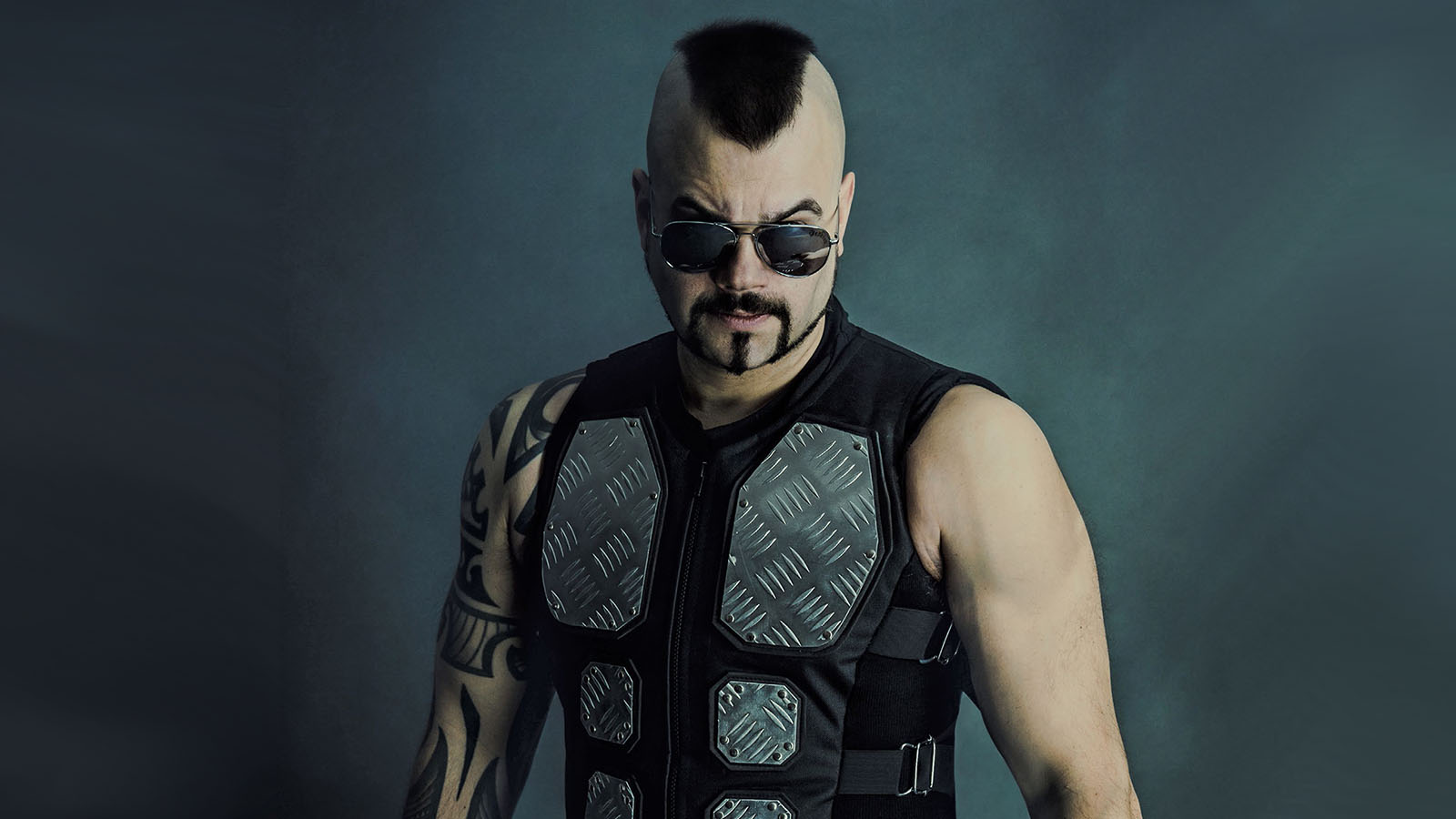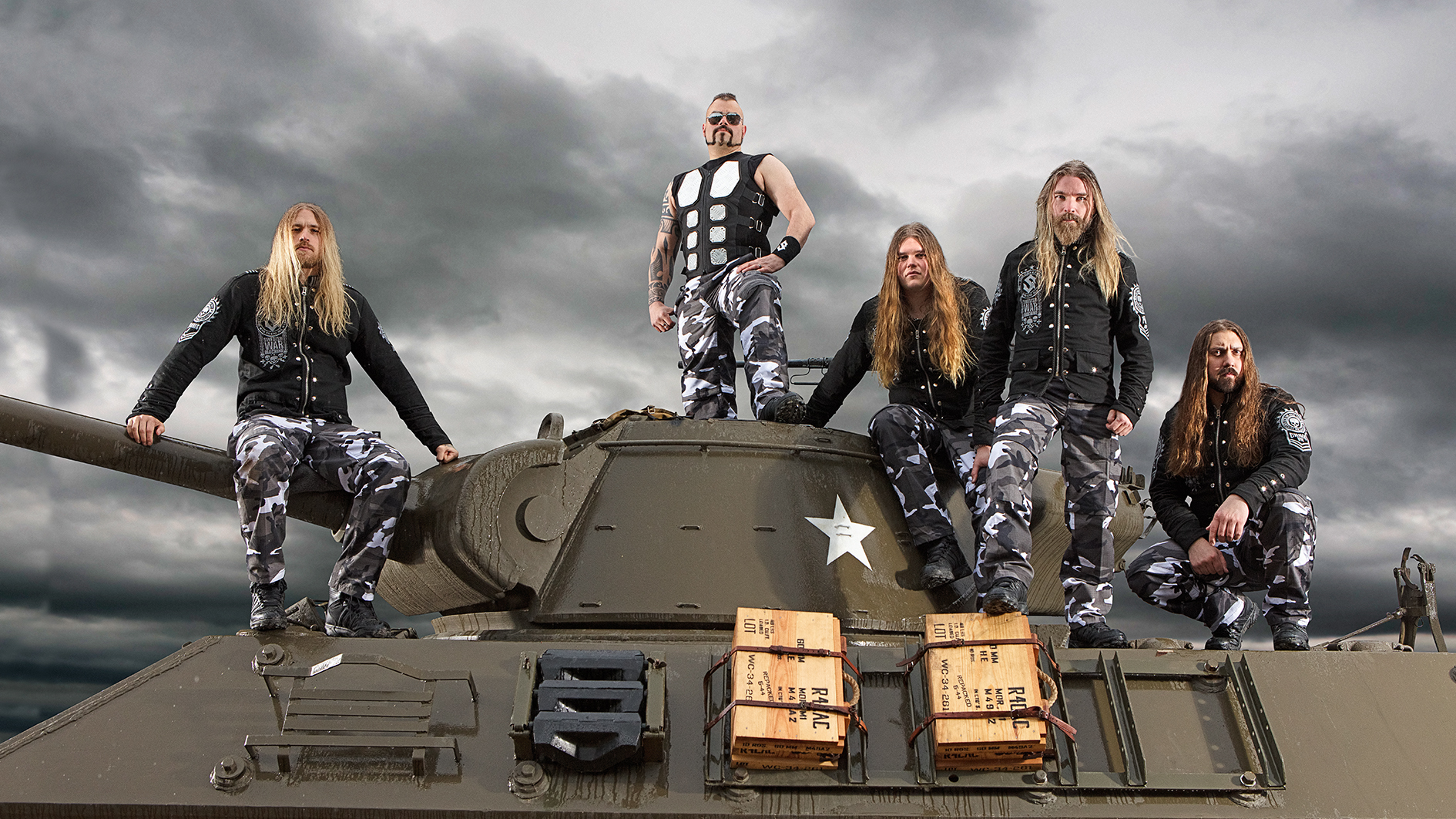Sabaton: "People have told us that they passed their history exams in school because of our songs"
In-depth with the mighty power-metal band from Sweden who built a thriving career singing about just about all things war

As Swedish power-metallers Sabaton gear up to celebrate their 20th anniversary in December, bassist Pär Sundström and vocalist/keyboardist/occasional guitarist Joakim Brodén - the group’s two founding members and elder statesmen - can take pride in knowing that the little band they formed in Falun, Sweden, two decades ago has evolved over time into a well-oiled, competition-crushing war machine.
But it wasn’t always that way. Sundström and Brodén know better than anyone that Sabaton have, in the past, been forced to cope with circumstances that might easily have stopped the group in its tracks.
The first blow came in 2002, just as the young and excited band was preparing to have its debut album, Metalizer, unleashed upon the power-metal masses. Sabaton delivered the completed album to Underground Symphony, the Italian label they had signed with, and all the label gave the band in return were excuses as to why the release date was being pushed back further and further.
In the end, the label told us, ‘Heavy metal is dead, and we have to wait until it becomes popular again.’
Pär Sundström
“We knew the album wasn’t going to change the world or anything because we certainly weren’t the songwriters that we would become later, but it was our first album and we were young, so we were super excited,” says Sundström on a Skype call from a Sabaton tour stop in Poland.
“We received all these explanations about why the album was being delayed and delayed and delayed, and in the end, the label told us, ‘Heavy metal is dead, and we have to wait until it becomes popular again.’ I couldn’t believe it - like, what, were they going to wait for 20 years to release the album? But that was that.”
Recording their debut album and having it shelved indefinitely cast a dark shadow over not just Sabaton’s situation at the time, but also their future. “2002 and 2003 were definitely the slowest years in Sabaton’s history - it was really boring around that time,” Sundström says.
“Even before that, in 1999, 2000 and 2001, the band was much more active and playing quite a lot of shows. But by 2002-2003, we were almost dead.”
Get The Pick Newsletter
All the latest guitar news, interviews, lessons, reviews, deals and more, direct to your inbox!
Down but far from out, Sundström, Brodén and the rest of the Sabaton lineup at the time shook off the disappointment of their first album being squelched and went back to work - but this time, a fire had been ignited within the band, and they knew that from this point forward, things would be different.
Primo Victoria was when Sabaton became Sabaton
Joakim Brodén
“We got so angry and so determined that it made us even more focused,” Brodén says. “We rehearsed even harder than before and worked on writing an even better second album, and we knew that this time we weren’t even going to give it to a record label, but would record it and finance it ourselves and then see who wanted to put it out.
"So without that setback of the first album, maybe Primo Victoria wouldn’t be the album that it is.”
“I think with Primo Victoria, that is when the real story of the band begins,” adds Sundström.
Ah, yes, Primo Victoria - the 2005 album that gave the world its first taste of the Sabaton that power-metallers hold in high regard today. “We didn’t really find our musical identity until Primo Victoria,” Brodén says. “That was when things started to make sense for us musically. That was when Sabaton became Sabaton.”
With Primo Victoria, chief lyricists Sundström and Brodén began writing songs centered specifically around wars, historical battles and acts of heroism - today, 15 years later, that theme is still at the heart of everything Sabaton, including the group’s current album, The Great War, a fist-pumping, headbanging commemoration of World War I.

“The whole war-history theme really came about with Primo Victoria,” says Sundström. “Before that, we didn’t have anything specific that we were writing about, and we were coming up with topics just for the sake of writing songs.
"But once we started to write about war history, it became very real and interesting to us because we were able to tell stories that were not fiction or fantasy - we could actually tell real, proper history.”
Unfortunately, humans have been very destructive toward each other since the beginning, and that never seems to change. So we’ll never run out of topics to sing about
Between Primo Victoria and The Great War, Sabaton - which is the name for the piece of armor used to protect the feet of knights - cemented their place among the power metal elite with such albums as Attero Dominatus (2006), The Art of War (2008), Coat of Arms (2010), and Heroes (2014), as well as the 2008 release of the aforementioned Metalizer album.
Historical topics covered along the way included the Falklands War, the bombings of Hiroshima and Nagasaki, the Battle of Kursk, the Warsaw Uprising, the fall of the Swedish Empire, the Vietnam War and countless other pivotal events in world war history.
“Unfortunately, humans have been very destructive toward each other since the beginning, and that never seems to change,” says Sundström, “so we’ll never run out of topics to sing about.”
Sundström and Brodén know full well that there are two sides to every story - or, in this case, at least two sides to every war. Given the polarizing nature of not only war, but politics and religion, the two take a neutral approach (they are from Sweden, after all) when it comes to penning lyrics - though that’s often easier said than done.
“Personally, we don’t take sides when writing about wars, but the songs themselves might be from one viewpoint over another,” says Sundström.
“But it can be a tricky thing - war is emotional, and in any battle, both sides were probably right in their own thoughts and ideas and reasons for fighting. So we have to approach these things with respect for both sides, even though sometimes we will choose to write about a song from one perspective.”
For the most part, all wars, conflicts, skirmishes, invasions, campaigns and military heroes and heroines are fair game as Sabaton song subjects - unless it’s a current, ongoing situation, in which case Sundström and Brodén stay clear.
“If it’s too current, we want to avoid it,” says Sundström. “Mainly because there’s so much propaganda going on around it, and we could very easily turn into a propaganda machine if we did that. We get a lot of requests from people for us to write about things that are happening in their country at the moment, but we’re not here for politics or to be used as propaganda, so we stick to historical topics.
Over the years, a lot of people have called us great teachers and told us that they passed their history exams in school because of our songs
Pär Sundström
"We’re not here to tell people what to do and how to live and who to vote for and all that - we’re here to tell a story, and whatever people want to do with that story is up to them.
“Music has been used as a tool to deliver political and religious messages since the Fifties and Sixties, and in many cases people are looking for it, even when it’s not really there,” adds Brodén.
“Every time we write a song, there’s a possibility that we’re pissing somebody off, but we can’t worry about that because we also have every chance of making someone happy or proud because of one of our songs.”
In 2012, shortly before a U.S. tour was scheduled to commence, the future of Sabaton was once again in jeopardy as Sundström and Brodén parted ways with all other band members, leaving the two founders to figure out how to regroup and carry on without losing any momentum now that Sabaton were considered by many to be a bona fide Swedish metal powerhouse.

“It was definitely a dark and scary time, because that lineup had been together for 13 years when that happened,” recalls Sundström.
“But we knew we needed the change. When the band first got together, everyone was super excited and wanted to be doing nothing else except playing in a band - but, 13 years down the road, people have families to feed and realize that they have other obligations in life and can’t just do the things they want to do, and maybe even change their minds about what they want to do for a living.
"So the change was unavoidable at that time. We had gone so far in those 13 years and some people were just not as excited about continuing as Joakim and I were. We ended up splitting with the other members, and some of them went on to form a band called Civil War so that they could keep doing the same thing, but on a smaller level. It’s not a full-time job for them anymore like it is for us.
Once we realized that we weren’t on the same page as the other members, we decided to go our separate ways instead of fighting it out and hating each other
“It wasn’t like we hated each other or anything like that - we were just on totally different levels when it came to certain things,” says Brodén. “Like, when we were booking a tour, they would say, ‘We can’t do that many shows - it’s too many!’ And I would be of the opinion that this is the bare minimum of shows we need to do if we’re going to do this professionally.
"Once we realized that we weren’t on the same page as the other members, we decided to go our separate ways instead of fighting it out and hating each other.”
Since the 2012 shakeup, the Sabaton roster went through a few other minor revisions before coalescing into the lineup that commands stages all over the world in matching camo pants and black shirts: Brodén on lead vocals, keyboards, and guitars, Sundström on bass, Hannes van Dahl on drums and the guitar tandem of Chris Rörland and Tommy Johannson.

Brodén is wholly satisfied with the current Sabaton lineup - which he considers the strongest in the group’s 20-year history - and lights up with enthusiasm when asked about guitarists Rörland and Johannson and how their talents contributed to the current album, The Great War.
Tommy Johannson is probably the most well-rounded musician in the band. He sings better than I do
Joakim Brodén
“Chris and Tommy are both fucking amazing musicians, and they contribute when it comes to songwriting as well, so I’m really happy about that,” says the singer. “Chris is a machine on guitar - anything you can think of, he can play. It’s insane, what he can do.
"Tommy is probably the most well-rounded musician in the band. He sings better than I do, he plays piano better than anyone else, he plays drums fairly well - so when we’re recording, he’s got everything in mind when it comes to the music. And that’s lovely because, in the past, it was all on me to figure those things out.”
2019 is shaping up to be one of the busiest and most successful years in Sabaton’s two decades of existence. It started in early February, when the group launched a YouTube channel called Sabaton History, which features 15-minute educational video documentaries of various battles and moments in military history, and how the group connect these historical events with their songs.
“Over the years, a lot of people have called us great teachers and told us that they passed their history exams in school because of our songs,” says Sundström, “and that’s very charming, but I can’t really agree with that.
"Personally, I don’t think you can teach or learn history in a three-minute song. But now, with the YouTube channel, we actually can teach about these topics. I consider this a major step forward in the evolution of the band.”
In April, as a gift to fans, Sabaton released an epic, torpedo-laden video for the non-album track Bismarck, a rousing ode to the legendary German battleship of the same name.
July saw the release of The Great War, and in early August the band hosted the four-day Sabaton Open Air Festival - featuring such acts as Candlemass, Grailknights, Lagerstein and Apocalyptica, among others - in Falun for the 11th straight year.
By October the band had made it to American shores for a tour with Swedish countrymates Hammerfall.
“Nobody ever told us that we should do this or that we should do that, so we’ve had to figure everything out on our own,” says Sundström. “I have a lot of ideas, and very often I make them happen.
"That’s why the Sabaton Open Air festival is now the second-biggest rock festival in all of Sweden. It’s grown from a one-day, indoor event to a four-day, open-air festival with two stages and over 20,000 people from more than 40 different countries traveling to be part of it.”
I remember us sitting around on weekends in Falun saying, ‘Wow, wouldn’t it be so cool if we could get to play Wacken one day?’ And now we’re headlining it
Joakim Brodén
Sabaton will close out the year in early December with the 10th annual sailing of the Sabaton Cruise - or, in this case, The Battleship - with the heavy metal vessel and its headbanging crew making the voyage from Stockholm, Sweden, to Tallinn, Estonia.
Obviously, with all of their 2019 goings-on, the Sabaton war machine is firing on all cylinders. Brodén and Sundström can certainly look back on the past 20 years with pride, knowing that they’ve paid their dues and accomplished what few bands from their part of the world - or the genre of power metal as a whole - have ever achieved.
“From the outside it looks like we had some kind of a master plan,” Brodén says. “But we didn’t. We really had to work at it and go through a lot of tweaks and steps to get it to this point.
"I remember us sitting around on weekends in Falun, drinking beer and trying to sing along with Judas Priest’s Painkiller and all that classic heavy metal, and saying, ‘Wow, wouldn’t it be so cool if we could get to play Wacken one day?’ And now we’re headlining it.”
But for all of their impressive accomplishments, it’s what lies ahead that excites the members of Sabaton the most. “I think the last 20 years are just in the past,” Sundström says. “Now we look to the future.”
As a teenager, Jeff Kitts began his career in the mid ’80s as editor of an underground heavy metal fanzine in the bedroom of his parents’ house. From there he went on to write for countless rock and metal magazines around the world – including Circus, Hit Parader, Metal Maniacs, Rock Power and others – and in 1992 began working as an assistant editor at Guitar World. During his 27 years at Guitar World, Jeff served in multiple editorial capacities, including managing editor and executive editor before finally departing as editorial director in 2018. Jeff has authored several books and continues to write for Guitar World and other publications and teaches English full time in New Jersey. His first (and still favorite) guitar was a black Ibanez RG550.
“There’d been three-minute solos, which were just ridiculous – and knackering to play live!” Stoner-doom merchants Sergeant Thunderhoof may have toned down the self-indulgence, but their 10-minute epics still get medieval on your eardrums
“There’s a slight latency in there. You can’t be super-accurate”: Yngwie Malmsteen names the guitar picks that don’t work for shred

![A black-and-white action shot of Sergeant Thunderhoof perform live: [from left] Mark Sayer, Dan Flitcroft, Jim Camp and Josh Gallop](https://cdn.mos.cms.futurecdn.net/am3UhJbsxAE239XRRZ8zC8.jpg)









